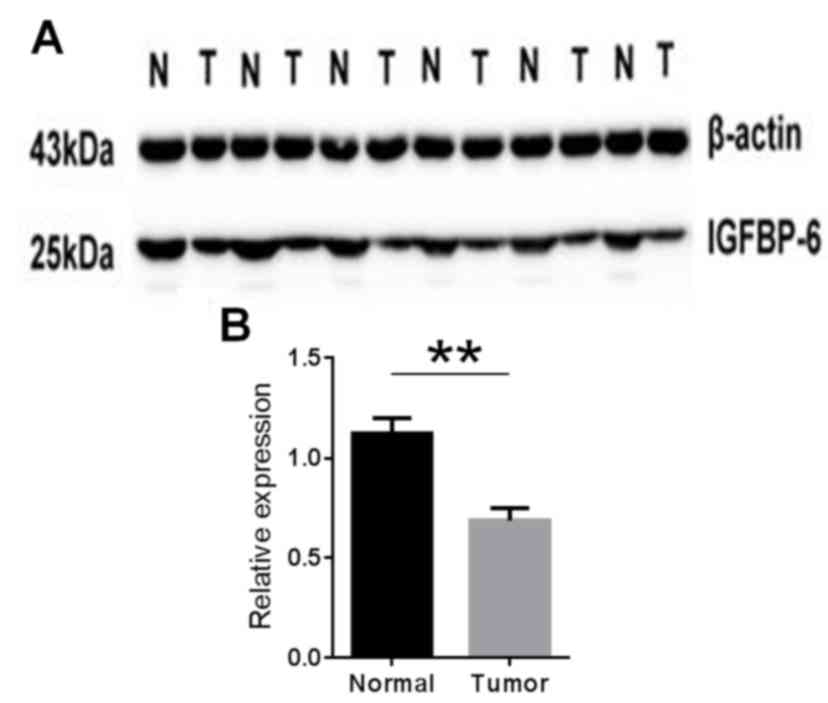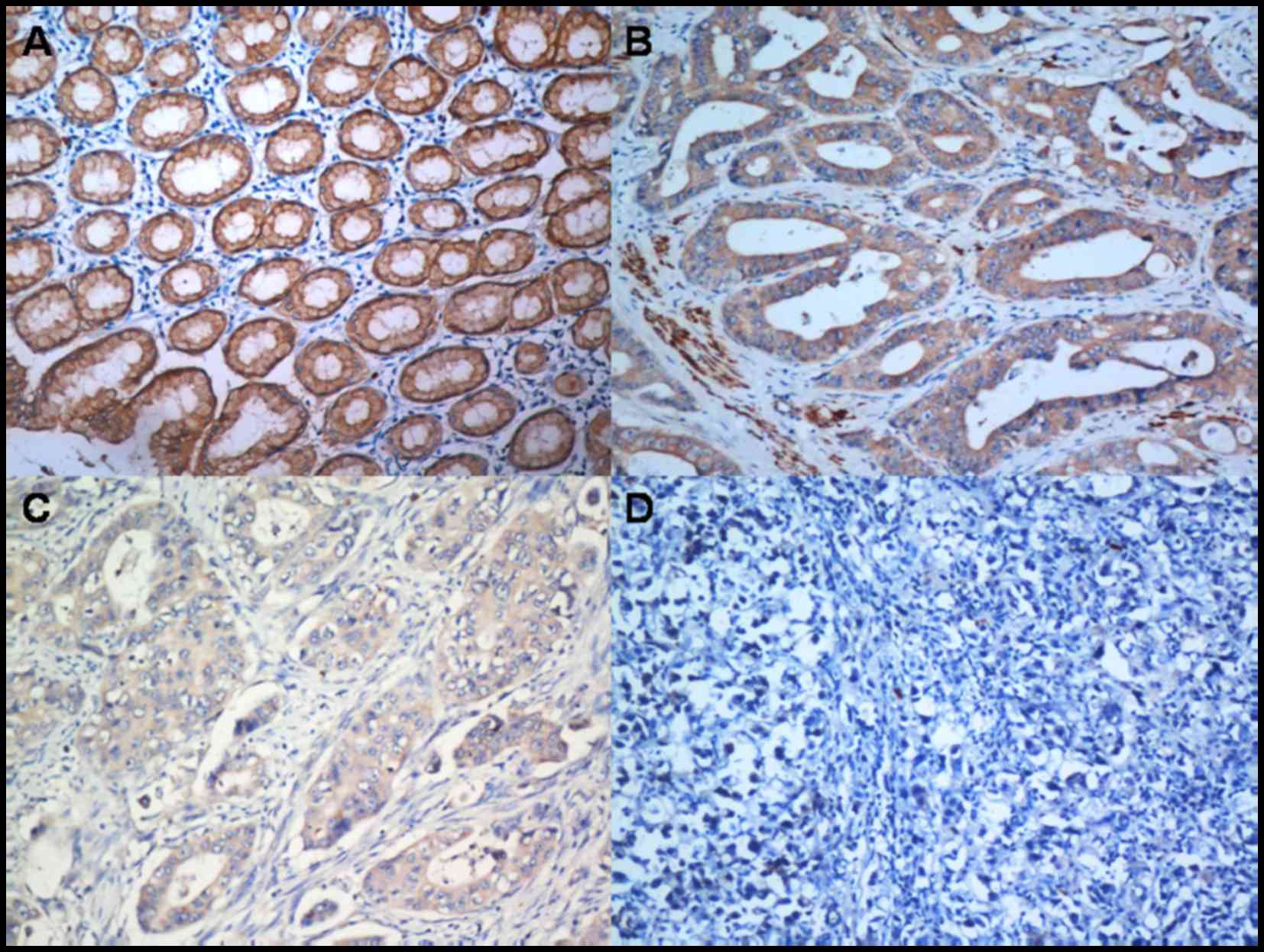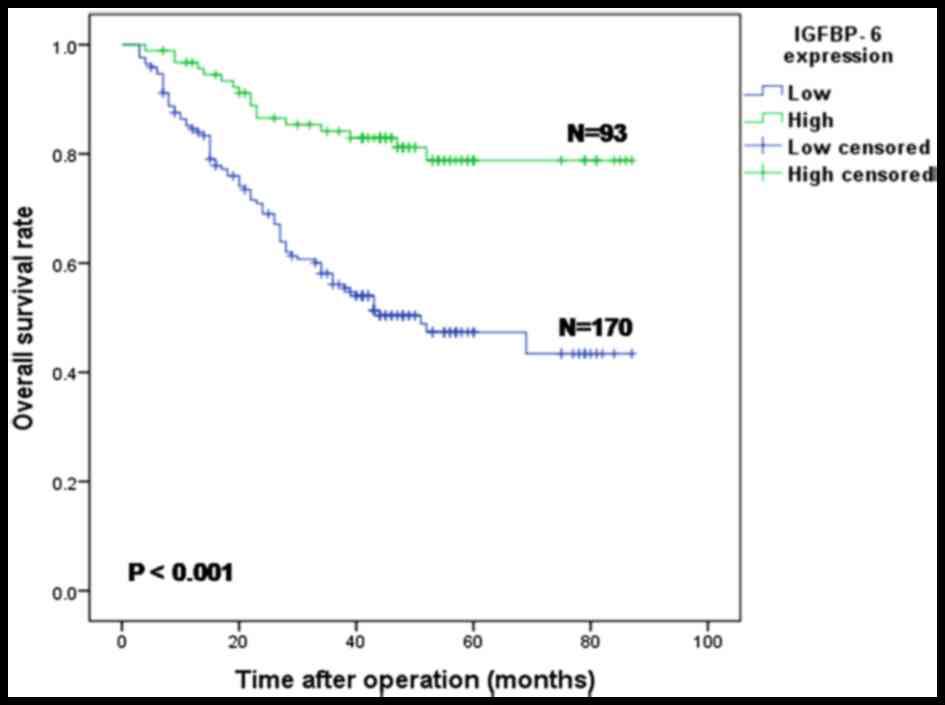|
1
|
Jemal A, Bray F, Center MM, Ferlay J, Ward
E and Forman D: Global cancer statistics. CA Cancer J Clin.
61:69–90. 2011. View Article : Google Scholar : PubMed/NCBI
|
|
2
|
Jemal A, Siegel R, Ward E, Hao Y, Xu J and
Thun MJ: Cancer statistics, 2009. CA Cancer J Clin. 59:225–249.
2009. View Article : Google Scholar : PubMed/NCBI
|
|
3
|
Hartgrink HH, Jansen EP, van Grieken NC
and van de Velde CJ: Gastric cancer. Lancet. 374:477–490. 2009.
View Article : Google Scholar : PubMed/NCBI
|
|
4
|
Nobili S, Bruno L, Landini I, Napoli C,
Bechi P, Tonelli F, Rubio CA, Mini E and Nesi G: Genomic and
genetic alterations influence the progression of gastric cancer.
World J Gastroenterol. 17:290–299. 2011. View Article : Google Scholar : PubMed/NCBI
|
|
5
|
Chen CN, Lin JJ, Chen JJ, Lee PH, Yang CY,
Kuo ML, Chang KJ and Hsieh FJ: Gene expression profile predicts
patient survival of gastric cancer after surgical resection. J Clin
Oncol. 23:7286–7295. 2005. View Article : Google Scholar : PubMed/NCBI
|
|
6
|
Yasui W, Oue N, Aung PP, Matsumura S,
Shutoh M and Nakayama H: Molecular-pathological prognostic factors
of gastric cancer: A review. Gastric Cancer. 8:86–94. 2005.
View Article : Google Scholar : PubMed/NCBI
|
|
7
|
Lee HS, Cho SB, Lee HE, Kim MA, Kim JH,
Park DJ, Kim JH, Yang HK, Lee BL and Kim WH: Protein expression
profiling and molecular classification of gastric cancer by the
tissue array method. Clin Cancer Res. 13:4154–4163. 2007.
View Article : Google Scholar : PubMed/NCBI
|
|
8
|
Oue N, Hamai Y, Mitani Y, Matsumura S,
Oshimo Y, Aung PP, Kuraoka K, Nakayama H and Yasui W: Gene
expression profile of gastric carcinoma: Identification of genes
and tags potentially involved in invasion, metastasis, and
carcinogenesis by serial analysis of gene expression. Cancer Res.
64:2397–2405. 2004. View Article : Google Scholar : PubMed/NCBI
|
|
9
|
Hippo Y, Taniguchi H, Tsutsumi S, Machida
N, Chong JM, Fukayama M, Kodama T and Aburatani H: Global gene
expression analysis of gastric cancer by oligonucleotide
microarrays. Cancer Res. 62:233–240. 2002.PubMed/NCBI
|
|
10
|
Yasui W, Oue N, Sentani K, Sakamoto N and
Motoshita J: Transcriptome dissection of gastric cancer:
Identification of novel diagnostic and therapeutic targets from
pathology specimens. Pathol Int. 59:121–136. 2009. View Article : Google Scholar : PubMed/NCBI
|
|
11
|
Iosef C, Vilk G, Gkourasas T, Lee KJ, Chen
BP, Fu P, Bach LA, Lajoie G, Gupta MB, Li SS and Han VK:
Insulin-like growth factor binding protein-6 (IGFBP-6) interacts
with DNA-end binding protein Ku80 to regulate cell fate. Cell
Signal. 22:1033–1043. 2010. View Article : Google Scholar : PubMed/NCBI
|
|
12
|
Minniti CP, Luan D, O'Grady C, Rosenfeld
RG, Oh Y and Helman LJ: Insulin-like growth factor II
overexpression in myoblasts induces phenotypic changes typical of
the malignant phenotype. Cell Growth Differ. 6:263–269.
1995.PubMed/NCBI
|
|
13
|
Osborne CK, Coronado EB, Kitten LJ,
Arteaga CI, Fuqua SA, Ramasharma K, Marshall M and Li CH:
Insulin-likegrowth factor-II (IGF-II): A potential
autocrine/paracrine growth factor forhuman breast cancer acting via
the IGF-I receptor. Mol Endocrinol. 3:1701–1709. 1989. View Article : Google Scholar : PubMed/NCBI
|
|
14
|
Thompson MA, Cox AJ, Whitehead RH and
Jonas HA: Autocrine regulation of human tumor cell proliferation by
insulin-like growth factor II: An in-vitro model. Endocrinology.
126:3033–3042. 1990. View Article : Google Scholar : PubMed/NCBI
|
|
15
|
Christofori G, Naik P and Hanahan D: A
second signal supplied by insulin-like growth factor II in
oncogene-induced tumorigenesis. Nature. 369:414–418. 1994.
View Article : Google Scholar : PubMed/NCBI
|
|
16
|
Cullen KJ, Allison A, Martire I, Ellis M
and Singer C: Insulin-like growth factor expression in breast
cancer epithelium and stroma. Breast Cancer Res Treat. 22:21–29.
1992. View Article : Google Scholar : PubMed/NCBI
|
|
17
|
Ho MN, Delgado CH, Owens GA and Steller
MA: Insulin-like growth factor-II participates in the biphasic
effect of a gonadotropin-releasing hormone agonist on ovarian
cancer cell growth. Fertil Steril. 67:870–876. 1997. View Article : Google Scholar : PubMed/NCBI
|
|
18
|
Firth SM and Baxter RC: Cellular actions
of the insulin-like growth factor binding proteins. Endocr Rev.
23:824–854. 2002. View Article : Google Scholar : PubMed/NCBI
|
|
19
|
Kiefer MC, Schmid C, Waldvogel M,
Schläpfer I, Futo E, Masiarz FR, Green K, Barr PJ and Zapf J:
Characterization of recombinant human insulin-like growth factor
binding proteins 4, 5, and 6 produced in yeast. J Biol Chem.
267:12692–12699. 1992.PubMed/NCBI
|
|
20
|
Bach LA: IGFBP-6 five years on; not so
‘forgotten’? Growth Horm IGF Res. 15:185–192. 2005. View Article : Google Scholar : PubMed/NCBI
|
|
21
|
Bach LA, Hsieh S, Brown AL and Rechler MM:
Recombinant human insulin-like growth factor (IGF)-binding
protein-6 inhibits IGF-II-induced differentiation of L6A1
myoblasts. Endocrinology. 135:2168–2176. 1994. View Article : Google Scholar : PubMed/NCBI
|
|
22
|
Dake BL, Boes M, Bach LA and Bar RS:
Effect of an insulin-like growth factor binding protein fusion
protein on thymidine incorporation in neuroblastoma and
rhabdomyosarcoma cell lines. Endocrinology. 145:3369–3374. 2004.
View Article : Google Scholar : PubMed/NCBI
|
|
23
|
Gallicchio MA, Kaun C, Wojta J, Binder B
and Bach LA: Urokinase type plasminogen activator receptor is
involved in insulin-like growth factor-induced migration of
rhabdomyosarcoma cells in vitro. J Cell Physiol. 197:131–138. 2003.
View Article : Google Scholar : PubMed/NCBI
|
|
24
|
Gallicchio MA, Kneen M, Hall C, Scott AM
and Bach LA: Overexpression of insulin-like growth factor binding
protein-6 inhibits rhabdomyosarcoma growth in vivo. Int J Cancer.
94:645–651. 2001. View
Article : Google Scholar : PubMed/NCBI
|
|
25
|
Kim EJ, Kang YH, Schaffer BS, Bach LA,
MacDonald RG and Park JH: Inhibition of Caco-2 cell proliferation
by all-trans retinoic acid: Role of insulin-like growth factor
binding protein-6. J Cell Physiol. 190:92–100. 2001. View Article : Google Scholar
|
|
26
|
Mohan S and Baylink DJ: IGF-binding
proteins are multifunctional and act via IGF-dependent and
-independent mechanisms. J Endocrinol. 175:19–31. 2002. View Article : Google Scholar : PubMed/NCBI
|
|
27
|
Sueoka N, Lee HY, Wiehle S, Cristiano RJ,
Fang B, Ji L, Roth JA, Hong WK, Cohen P and Kurie JM: Insulin-like
growth factor binding protein-6 activates programmed cell death in
non-small cell lung cancer cells. Oncogene. 19:4432–4436. 2000.
View Article : Google Scholar : PubMed/NCBI
|
|
28
|
Sano T: Evaluation of the gastric cancer
treatment guidelines of the Japanese Gastric Cancer Association.
Gan To Kagaku Ryoho. 37:582–586. 2010.(In Japanese). PubMed/NCBI
|
|
29
|
Berlth F, Bollschweiler E, Drebber U,
Hoelscher AH and Moenig S: Pathohistological classification systems
in gastric cancer: Diagnostic relevance and prognostic value. World
J Gastroenterol. 20:5679–5684. 2014. View Article : Google Scholar : PubMed/NCBI
|
|
30
|
Wittekind C: 2010 TNM system: On the 7th
edition of TNM classification of malignant tumors. Pathologe.
31:331–332. 2010.(In German). View Article : Google Scholar : PubMed/NCBI
|
|
31
|
Livak and Schmittgen: Analysis of relative
gene expression data using real-time quantitative PCR and the
2-ΔΔCt method. Methods. 25:402–408. 2001. View Article : Google Scholar : PubMed/NCBI
|
|
32
|
Wang W, Lv L, Pan K, Zhang Y, Zhao JJ,
Chen JG, Chen YB, Li YQ, Wang QJ, He J, et al: Reduced expression
of transcription factor AP-2α is associated with gastric
adenocarcinoma prognosis. PLoS One. 6:e248972011. View Article : Google Scholar : PubMed/NCBI
|
|
33
|
Li YF, Wang DD, Zhao BW, Wang W, Yuan SQ,
Huang CY, Chen YM, Zheng Y, Keshari RP, et al: Poor prognosis of
gastric adenocarcinoma with decreased expression of AHRR. PLoS One.
7:e435552012. View Article : Google Scholar : PubMed/NCBI
|
|
34
|
Huang CY, Chen YM, Zhao JJ, Chen YB, Jiang
SS, Yan SM, Zhao BW, Pan K, Wang DD, Lv L, et al: Decreased
expression of transcription elongation factor A-like 7 is
associated with gastric adenocarcinoma prognosis. PLoS One.
8:e546712013. View Article : Google Scholar : PubMed/NCBI
|
|
35
|
El-Badry OM, Romanus JA, Helman LJ, Cooper
MJ, Rechler MM and Israel MA: Autonomous growth of a human
neuroblastoma cell line is mediated by insulin-like growth factor
II. J Clin Invest. 84:829–839. 1989. View Article : Google Scholar : PubMed/NCBI
|
|
36
|
Stewart CE and Rotwein P: Growth,
differentiation, and survival: Multiple physiological functions for
insulin-like growth factors. Physiol Rev. 76:1005–1026.
1996.PubMed/NCBI
|
|
37
|
Toretsky JA and Helman LJ: Involvement of
IGF-II in human cancer. J Endocrinol. 149:367–372. 1996. View Article : Google Scholar : PubMed/NCBI
|
|
38
|
LeRoith D, Baserga R, Helman L and Roberts
CT Jr: Insulin-like growth factors and cancer. Ann Intern Med.
122:54–59. 1995. View Article : Google Scholar : PubMed/NCBI
|
|
39
|
Lu L, Katsaros D, Wiley A, de la Longrais
IA Rigault, Risch HA, Puopolo M and Yu H: The relationship of
insulin-like growth factor-II, insulin-like growth factor binding
protein-3, and estrogen receptor-alpha expression to disease
progression in epithelial ovarian cancer. Clin Cancer Res.
12:1208–1214. 2006. View Article : Google Scholar : PubMed/NCBI
|
|
40
|
Denley A, Wallace JC, Cosgrove LJ and
Forbes BE: The insulin receptor isoform exon 11-(IR-A) in cancer
and other diseases: A review. Horm Metab Res. 35:778–785. 2003.
View Article : Google Scholar : PubMed/NCBI
|
|
41
|
Frasca F, Pandini G, Scalia P, Sciacca L,
Mineo R, Costantino A, Goldfine ID, Belfiore A and Vigneri R:
Insulin receptor isoform A, a newly recognized, high-affinity
insulin-like growth factor II receptor in fetal and cancer cells.
Mol Cell Biol. 19:3278–3288. 1999. View Article : Google Scholar : PubMed/NCBI
|
|
42
|
Kalli KR, Falowo OI, Bale LK, Zschunke MA,
Roche PC and Conover CA: Functional insulin receptors on human
epithelial ovarian carcinoma cells: Implications for IGF-II
mitogenic signaling. Endocrinology. 143:3259–3267. 2002. View Article : Google Scholar : PubMed/NCBI
|
|
43
|
Sciacca L, Mineo R, Pandini G, Murabito A,
Vigneri R and Belfiore A: In IGF-I receptor-deficient
leiomyosarcoma cells autocrine IGF-II induces cell invasion and
protection from apoptosis via the insulin receptor isoform A.
Oncogene. 21:8240–8250. 2002. View Article : Google Scholar : PubMed/NCBI
|
|
44
|
Vella V, Pandini G, Sciacca L, Mineo R,
Vigneri R, Pezzino V and Belfiore A: A novel autocrine loop
involving IGF-II and the insulin receptor isoform-A stimulates
growth of thyroid cancer. J Clin Endocrinol Metab. 87:245–254.
2002. View Article : Google Scholar : PubMed/NCBI
|
|
45
|
Bach LA: Insulin-like growth factor
binding protein-6: The ‘forgotten’ binding protein? Horm Metab Res.
31:226–234. 1999. View Article : Google Scholar : PubMed/NCBI
|
|
46
|
Kuo YS, Tang YB, Lu TY, Wu HC and Lin CT:
IGFBP-6 plays a role as an oncosuppressor gene in NPC pathogenesis
through regulating EGR-1 expression. J Pathol. 222:299–309. 2010.
View Article : Google Scholar : PubMed/NCBI
|
|
47
|
Leng SL, Leeding KS, Whitehead RH and Bach
LA: Insulin-like growth factor (IGF)-binding protein-6 inhibits
IGF-II-induced but not basal proliferation and adhesion of LIM 1215
colon cancer cells. Mol Cell Endocrinol. 174:121–127. 2001.
View Article : Google Scholar : PubMed/NCBI
|
|
48
|
Saeki N, Ono H, Sakamoto H and Yoshida T:
Genetic factors related to gastric cancer susceptibility identified
using a genome-wide association study. Cancer Sci. 104:1–8. 2013.
View Article : Google Scholar : PubMed/NCBI
|
|
49
|
Nagini S: Carcinoma of the stomach: A
review of epidemiology, pathogenesis, molecular genetics and
chemoprevention. World J Gastrointest Oncol. 4:156–169. 2012.
View Article : Google Scholar : PubMed/NCBI
|


















